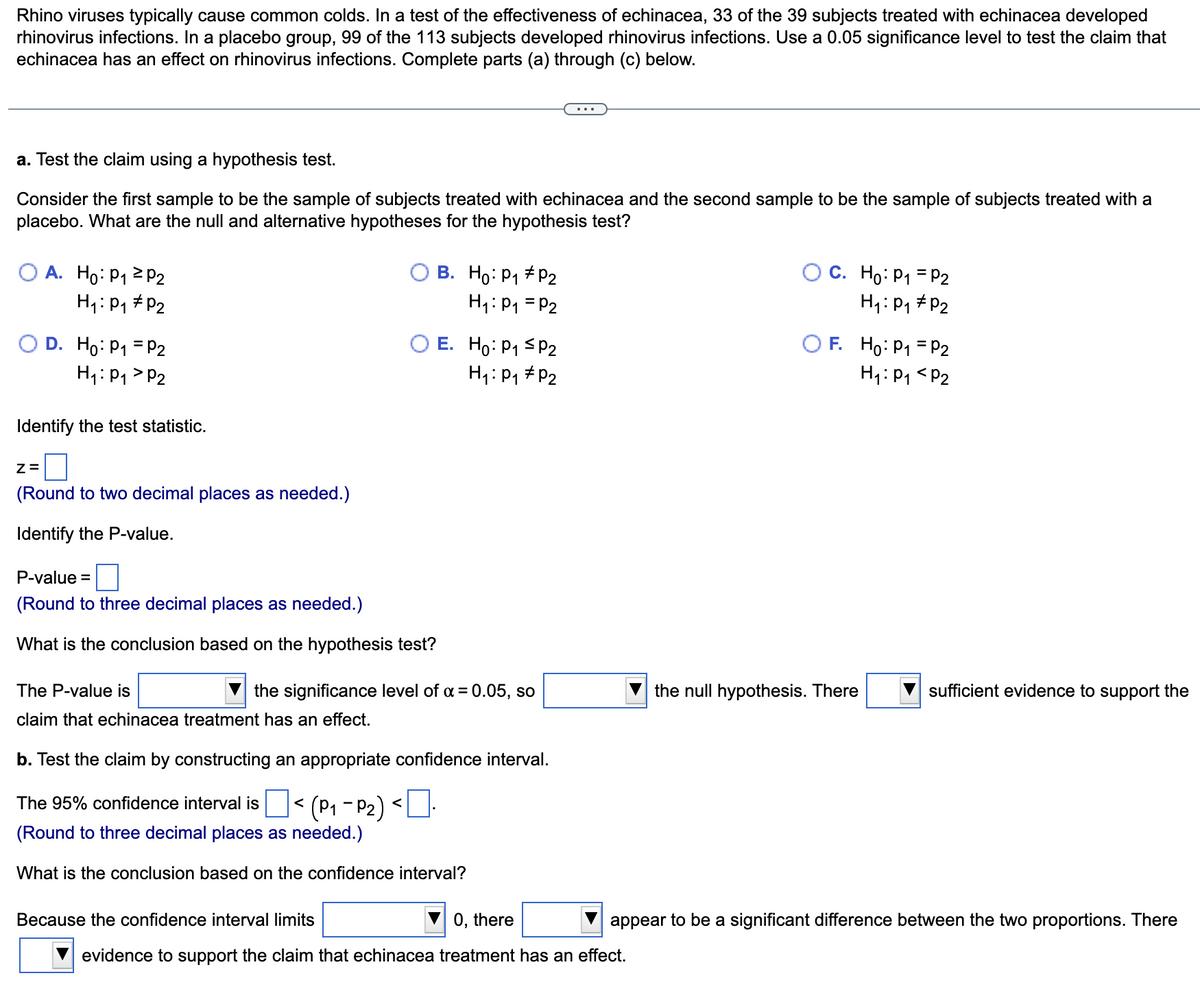Rhino viruses typically cause common colds. In a test of the effectiveness of echinacea, 33 of the 39 subjects treated with echinacea developed rhinovirus infections. In a placebo group, 99 of the 113 subjects developed rhinovirus infections. Use a 0.05 significance level to test the claim that echinacea has an effect on rhinovirus infections. Complete parts (a) through (c) below. a. Test the claim using a hypothesis test. Consider the first sample to be the sample of subjects treated with echinacea and the second sample to be the sample of subjects treated with a placebo. What are the null and alternative hypotheses for the hypothesis test? O A. Ho: P1 2P2 H1: P1 #P2 O B. Ho:P1 #P2 H1: P1 = P2 O C. Ho: P1 = P2 H1: P1 #P2 O D. Ho: P1 = P2 H1:P1 > P2 O E. Ho: P1 S P2 H1:P, # P2 O F. Ho: P1 = P2 H1: P1
Rhino viruses typically cause common colds. In a test of the effectiveness of echinacea, 33 of the 39 subjects treated with echinacea developed rhinovirus infections. In a placebo group, 99 of the 113 subjects developed rhinovirus infections. Use a 0.05 significance level to test the claim that echinacea has an effect on rhinovirus infections. Complete parts (a) through (c) below. a. Test the claim using a hypothesis test. Consider the first sample to be the sample of subjects treated with echinacea and the second sample to be the sample of subjects treated with a placebo. What are the null and alternative hypotheses for the hypothesis test? O A. Ho: P1 2P2 H1: P1 #P2 O B. Ho:P1 #P2 H1: P1 = P2 O C. Ho: P1 = P2 H1: P1 #P2 O D. Ho: P1 = P2 H1:P1 > P2 O E. Ho: P1 S P2 H1:P, # P2 O F. Ho: P1 = P2 H1: P1
College Algebra (MindTap Course List)
12th Edition
ISBN:9781305652231
Author:R. David Gustafson, Jeff Hughes
Publisher:R. David Gustafson, Jeff Hughes
Chapter8: Sequences, Series, And Probability
Section8.7: Probability
Problem 6E: List the sample space of each experiment. Tossing three coins
Related questions
Question
the p-value is (less than, greater than) the significance level of 0.05, so (fail to reject, reject) the null hypothesis. there (is, is not) sufficient evidence to support the claim that echinacea has an effect.
Because the confidence intervals limits (include, do not include) 0, there (does, does not) appear to be a significant difference between the two proportions. there (is, is not) evidence to support the claim.

Transcribed Image Text:Rhino viruses typically cause common colds. In a test of the effectiveness of echinacea, 33 of the 39 subjects treated with echinacea developed
rhinovirus infections. In a placebo group, 99 of the 113 subjects developed rhinovirus infections. Use a 0.05 significance level to test the claim that
echinacea has an effect on rhinovirus infections. Complete parts (a) through (c) below.
a. Test the claim using a hypothesis test.
Consider the first sample to be the sample of subjects treated with echinacea and the second sample to be the sample of subjects treated with a
placebo. What are the null and alternative hypotheses for the hypothesis test?
O A. Ho: P1 2 p2
H: P1 # P2
B. Ho: P1 # P2
O C. Ho: P1 = P2
H1: P1 # P2
H1: P1 = P2
O E. Ho: P1 sp2
H1: P1 # P2
O F. Ho: P1 = P2
H1:P1 <P2
D. Ho: P1 = P2
H4: P1 > P2
Identify the test statistic.
(Round to two decimal places as needed.)
Identify the P-value.
P-value =
(Round to three decimal places as needed.)
What is the conclusion based on the hypothesis test?
The P-value is
the significance level of a = 0.05, so
the null hypothesis. There
sufficient evidence to support the
claim that echinacea treatment has an effect.
b. Test the claim by constructing an appropriate confidence interval.
The 95% confidence interval is|< (P1 - P2) <U:
(Round to three decimal places as needed.)
What is the conclusion based on the confidence interval?
Because the confidence interval limits
0, there
appear to be a significant difference between the two proportions. There
evidence to support the claim that echinacea treatment has an effect.

Transcribed Image Text:A. Echinacea does appear to have a significant effect on the infection rate. There is evidence that it lowers the infection rate.
B. Echinacea does appear to have a significant effect on the infection rate. There is evidence that it increases the infection rate.
C. Echinacea does not appear to have a significant effect on the infection rate.
D. The results are inconclusive.
Expert Solution
This question has been solved!
Explore an expertly crafted, step-by-step solution for a thorough understanding of key concepts.
Step by step
Solved in 6 steps

Recommended textbooks for you

College Algebra (MindTap Course List)
Algebra
ISBN:
9781305652231
Author:
R. David Gustafson, Jeff Hughes
Publisher:
Cengage Learning

Glencoe Algebra 1, Student Edition, 9780079039897…
Algebra
ISBN:
9780079039897
Author:
Carter
Publisher:
McGraw Hill

College Algebra (MindTap Course List)
Algebra
ISBN:
9781305652231
Author:
R. David Gustafson, Jeff Hughes
Publisher:
Cengage Learning

Glencoe Algebra 1, Student Edition, 9780079039897…
Algebra
ISBN:
9780079039897
Author:
Carter
Publisher:
McGraw Hill